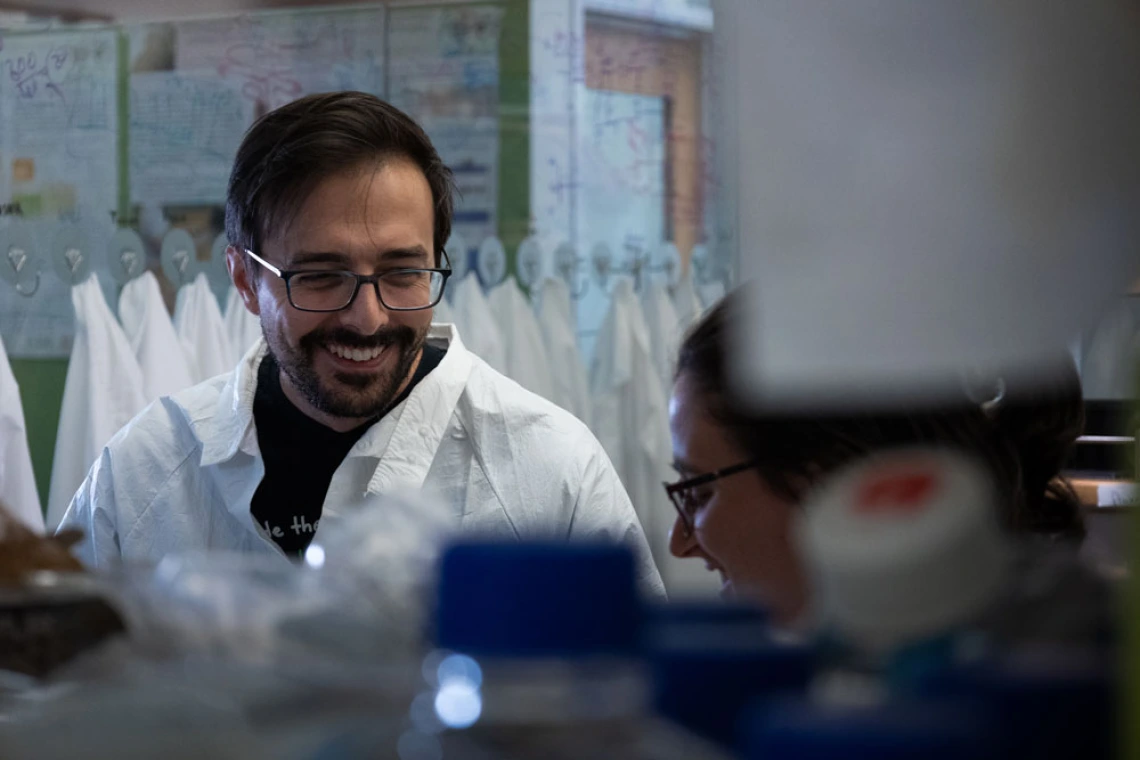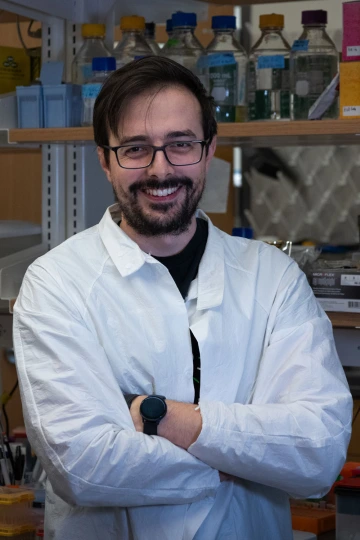Viruses, cancer, and the road to research independence
2021 BIO5 Postdoctoral Fellow Rob Jackson at the University of Arizona College of Medicine - Tucson secured a pivotal National Institutes of Health grant to establish his career in virology and oral cancer.

Postdoctoral researcher and cancer virologist Rob Jackson works with doctoral candidate Isabelle (Issy) Tobey at their lab in the Biosciences Research Laboratories building at the University of Arizona.
Transitions are tough. For postdoctoral researchers pursuing academic research, the passage from a mentored, temporary job to an independent faculty position is filled with uncertainty when it comes to funding and career development.
Rob Jackson is one of those postdoctoral researchers in pursuit of a tenure track professorship. He performs basic research on the biology of human papillomaviruses (HPV) that may one day lead to innovative cancer therapeutics under the mentorship of BIO5 member Koenraad Van Doorslaer, associate professor of immunobiology and co-leader of the Cancer Biology Program at the U of A Cancer Center.
“Viruses are fascinating tools for studying human biology,” said Jackson. “I aim to leverage the ancient co-evolutionary relationships between pathogens and host to contribute fundamental knowledge to our understanding of biological processes including normal differentiation and cancer.”
Jackson was a BIO5 Postdoctoral Fellow in 2021, an internal program at the BIO5 Institute aiming to help postdoctoral researchers transition to the next step in their career. The one-year long program provides funding to support postdoctoral researchers' independent goals to make them competitive for future awards. Entering its seventh year, the fellowship has supported over 45 postdoctoral researchers in pursuing academic research and industry positions.
Now, Jackson is one big step closer to his goal of becoming a professor with his own research lab. In September 2024, he was awarded the esteemed National Institutes of Health (NIH) Pathway to Independence Award (K99/R00), which helps promising postdoctoral researchers to transition to faculty positions.
“I am incredibly grateful for this award as it provides an opportunity for me to complete my postdoctoral training here in the Van Doorslaer lab while providing funds to help support my transition,” said Jackson. “I view the award as a strong endorsement for our team: for my mentors, especially Koenraad, my lab mates, as well as my colleagues here at the BIO5 Institute, Department of Immunbiology, and the Cancer Center.”
Controlling viruses to stop cancer

Rob Jackson, PhD
Jackson and the Van Doorslaer lab study HPV, a group of viruses that infect the skin and moist surfaces of the body — inside the mouth, for example. These viruses can lay dormant for years and usually infections resolve on their own, but under certain conditions specific high-risk HPV leads to cancer.
To better understand the origins of these cancers, Jackson and the Van Doorslaer lab want to understand the complicated answer to a simple question: How do these viruses seize control of cells?
“HPV is notorious for doing funky things,” said Jackson. “It infects cells in our mucosal epithelium and reprograms those cells. This in turn disrupts the normal life cycle of these infected cells, causing them to divide uncontrollably.”
This uncontrollable division of cells due to a long-lasting persistent infection is what can lead to the development of cancer.
To take a closer look at the virus, Jackson and his team grew 3D structures of HPV-infected cells. These structures closely resemble what happens in the human body, with the virus infecting the epithelium, the thin layer of outermost cells that separate the body from the environment
“We are most interested in what controls the virus becoming oncogenic — turning normal cells into cancerous cells,” said Jackson. “If we know what genes regulate that, we can create therapeutics that can drive the virus activity away from cancer.”
Establishing a cancer virology lab
Jackson has been building his pathway to the K99/R00 grant since he joined the Van Doorslaer lab in 2019. Coming from Canada to the United States, he wanted to combine his passion for tissue engineering, molecular biology, and computational work.
The funding from BIO5 Postdoctoral Fellowship starting in January 2021 helped Jackson further his expertise in 3D techniques and bioinformatics to study HPV biology at the level of a single cell.
Because of the fellowship, he was able to collaborate with the lab of BIO5 member Melissa Herbst-Kralovetz, professor of basic medical sciences at the U of A College of Medicine – Phoenix and Cancer Center member. Through this collaboration, he learned about a 3D-rotating wall bioreactor system that mimics the body’s natural environment to grow life-like tissues.
“This collaboration was important since I not only gained expertise in a new technique, but also benefitted from structured mentorship and career advice from Dr. Herbst-Kralovetz and my committee members,” said Jackson.
Over the next three years, Jackson built off his BIO5 Postdoctoral Fellowship project to apply for grants, publish papers, and present at conferences. Jackson and his collaborators received nine awards for research he was involved in, published four papers, and presented their research over 40 times in both oral and poster presentations.
Now, Jackson will use the K99/R00 grant from the National Institute of Dental and Craniofacial Research, one of the institutes of the NIH, to establish his independent research program focused on HPV infection and oral health.
“I want to map the spatial and temporal transcriptome of oropharyngeal tissues, which are understudied,” said Jackson. “We want to understand how HPV might be infecting the tonsils, base of the tongue, floor of the mouth, salivary glands, and other oral tissues.”
The grant supports up to five years of funding; the first few years, Jackson will continue as postdoctoral researcher for the mentored phase (K99) of the grant. He will then be expected to secure a tenure track professorship for the research phase (R00) in order to use the research project grant for up to three years.
This research is supported by the Natural Sciences and Engineering Research Council of Canada (NSERC), National Institute of Dental & Craniofacial Research of the National Institutes of Health under Award Numbers R03DE030211 and K99DE033483, and the University of Arizona Cancer Center Shared Resource P30 CCSG.
